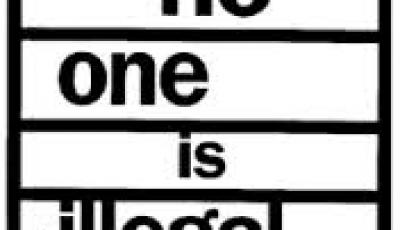Post by Ruben Andersson, postdoctoral researcher in the Civil Society and Human Security Research Unit at the London School of Economics. His new book, Illegality, Inc., is available from University of California Press.
A comment trickled in on a mailing list after a recent blog post of mine on my recent book, Illegality, Inc.: Clandestine Migration and the Business of Bordering Europe. “And if we would finally stop to speak about ‘illegality’ and ‘clandestine migration,’ even if it is in quotation marks?” it asked.
“Yes,” was my first reaction. Of course we should. I recalled how, many years back as an intern with a Mexican migrants’ rights NGO, I was tasked with dutifully replacing all mentions of “illegal” in media reports with the word “undocumented” for our news digests. “No,” was nevertheless my second reaction―not yet, or not so fast, or at least not by everyone and in every context. Here’s why.
Illegal or irregular, undocumented or unauthorised, sans-papiers or illegalised―the vocabulary on the “problem” of human mobility in the shadow of nation-states is large and expanding. NGOs, activists, academics, and even policymakers have long clamoured for a move away from the incorrect and pejorative term illegal, for instance in the influential “No One is Illegal” campaign. Terminology has, in short, become a battlefield, and for good reason. Yet as I formulated a response in my head to the question above, three quotes from my project on migration controls in Europe’s African borderlands came to mind―one from a high-ranking academic, another from a Spanish border guard, and a third from an African migrant, all of which complicate the terminological picture.
“But they are illegal, right?”
The question came after an hour-long academic presentation of mine on how migrants came to be labelled and treated as “illegal” on their journeys through West and North Africa. It was an obvious query―too obvious for someone as deep into the topic as myself. Despite my immediate protestations, it indicated how deeply commonsensical the popular notion of migrant “illegality” is, even in lofty academia.
Such popular (or “folk”) understandings of illegality are certainly wrong and harmful in most important respects, as repeatedly pointed out by campaigners, human rights advocates, academics, and media commentators. The term illegal is pejorative, stigmatising, and even incorrect, implying as it does that migrants are criminals when they have usually only committed an administrative infraction. While the creeping criminalisation of migration is unfortunately changing this in some jurisdictions, “illegal” remains extremely insidious when used to label people rather than actions. To cite one voice in the debate, “when you label someone an ‘illegal alien’ or ‘illegal immigrant’ or just plain ‘illegal,’ you are effectively saying the individual, as opposed to the actions the person has taken, is unlawful.” This was why Associated Press finally saw some sense and dropped illegal immigrant from its vocabulary in 2013. The Guardian's recent consultation with readers on the term seems to have been inconclusive, however.

These ethical and analytical problems with the term mean that analysts, activists, and even border guards increasingly talk of irregular, unauthorised, or undocumented migration instead. Yet problems abound here too.
“

It was precisely these multiple folk understandings that interested me in my project―how “illegality” was put to use, and to what effect. In this ethnographic context, concerned with what I call Europe’s “illegality industry,” I certainly could not shy away from using the term illegal. In this, I followed the lead of anthropologist Sarah Willen, who has defended the ethnographic usage of illegal owing to “the cross-contextual applicability of the term, its substantial material consequences, and its impact on migrants’ own experiences of everyday life.” When used judiciously in this way―as a folk term of social differentiation, carrying particular connotations―the term can be undermined, questioned, and interrogated from within.
At the same time, I needed a more analytical category, and ended up using clandestine migration, for three reasons. First, Francophone migrants and border workers who I encountered used the term migration clandestine themselves. Second, this term’s English equivalent is relatively neutral, unlike in French (in fact, it is something of a false friend: the French clandestin and migration clandestine carry the connotations of “illegal immigrant” and “illegal migration”). The English clandestine, in this sense, serves a similar purpose as “irregular.” Yet unlike irregular, third, it is not merely a negative legal inscription. While on the road, the “clandestine migrant”―as anthropologist Susan Bibler Coutin has also shown―frequently hides from police, evades border checks, and disguises himself through recourse to false documentation, ad hoc dress codes, and furtive behaviour. For these three reasons―the term’s local resonances, its relative neutrality and its embodied connotations―I ended up using clandestine migration as a crossover folk-analytical category.
These solutions are far from perfect, and the risk remains of contributing to what one sets out to criticise. Yet as an anthropologist―unlike, say, an activist―this is a risk I was willing to take. I could not simply ignore these terms, because they were a fundamental part of the social field I was investigating.
My feeling was also that the debate is something of a sideshow to the main semantic question. For at the centre of these debates stands a term that is rarely subjected to enough scrutiny: migrant (or immigrant).
The fact that migrant refers to a person’s whole being is precisely what gives illegal, irregular and so forth their peculiar power. Even when on its own, however, it carries particular connotations, marking certain people on the move as a particular kind of traveller. This is not only legally problematic, as in the blanket usage of “migrants” to cover refugees, as another blog post recently pointed out; it also involves a larger erasure. While some contemporary travellers―whether executives, “expats,” or tourists―are celebrated for their mobility, others are fretted about for the same reasons. It is for them that the label migrant is usually reserved. What they have in common is their relative poverty and the suspicion attached to their movements. This labelling (often racially motivated), along with the erasures it allows, means that we urgently need a debate on “migranthood” itself, not just its problematic qualifiers.
Back in the real world, where labels remain necessary, let me end with my preference among such qualifiers: unauthorised, because of its relative accuracy and neutrality in relation to the state. In this vein, and as my PhD supervisor once suggested, we should perhaps best talk of “unauthorised movement”―a term that leaves any blame squarely in the state camp. But what word should we then use for those who move in such a fashion? Let me end by citing a rather apposite tweet by European commissioner Malmström, posted in response to protestations over what to call “illegal immigrants” after the Associated Press decision to drop the term: “How about calling them ‘people’?”
Any comments about this post? Get in touch with us! Send us an email, or post a comment here or on Facebook. You can also tweet us.
__________
How to cite this blog post (Harvard style):
Andersson R (2014) Illegal, Clandestine, Irregular: On Ways of Labelling People. Available at: http://bordercriminologies.law.ox.ac.uk/illegal-clandestine-irregular/ (Accessed [date]).
Share:








